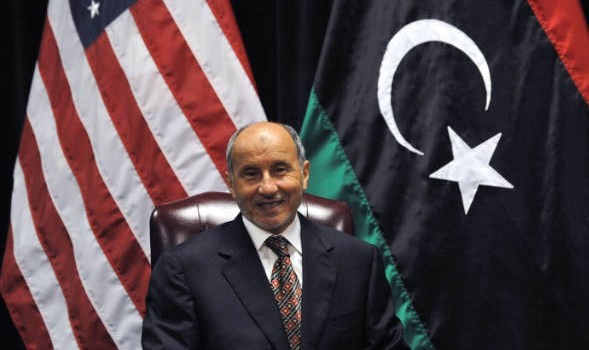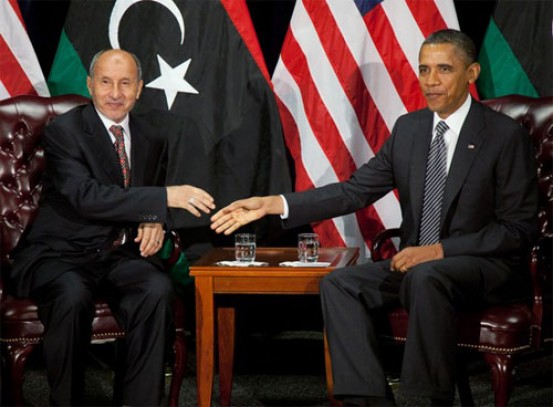By The AfricaPaper

New York–Interim Libyan leader Mustafa Abdel Jalil for the first time met with US President Barrack Obama since his rebel forces ended the 40 year rule of Col. Muammar el-Qaddafi two months ago.
The chairman of the National Transitional Council met with the US president this week on the sidelines of the United Nations General Assembly in New York just before talks between Mr. Obama and US allies on Libya.
Subsequent to the meeting between the two leaders, Mr. Obama called on fighters loyal to the ousted leader to relinquish their arms, warning that NATO mission would continue amidst resistance from remnants of the Qaddafi army. Mr. Obama also used the occasion to announce the reopening of the US Embassy in Tripoli, once again reinforcing US support for the new transitional government in this North African nation of six million people.
“Today the Libyan people are writing a new chapter in the life of their nation after four decades of darkness, they can walk the streets, free from a tyrant.” Mr. Obama said at a meeting attended by Mr. Jalil.
Later in the day, Chairman Jalil, who received a warm reception from the United Nation General Assembly, told world leaders that the new Libya is committed to peace, security and democracy, a statement welcomed by Mr. Obama and his European allies who backed the rebel leader in the wake of the protest against Mr. Qaddafi’s regime.

“I want to assure everyone that Libya will be a vital state, a vibrant state that upholds the principles of peace and security in the region, a state that respects human rights, and establishes a nation in which Libyans can government themselves and seek official position through elections,” Mr. Jalil told the crowd of world leaders.
Mr. Jalil came to the United Nations General Assembly after an overwhelming UN vote to give Libya’s seat to the council following the ouster of Qaddafi.
Hours before Mr. Jalil’s appearance at the world stage, Qaddafi issued a statement denouncing the new regime.
“What is happening in Libya is a charade which can only take place thanks to the air raids which will not last forever,” said Qaddafi, whose whereabouts remain unknown.
The ousted leader and his son, Seif al-Islam along with intelligent chief Abdul al-Senussi are wanted for alleged crimes against humanity
“Do not rejoice and don’t believe that one regime has been overthrown and another imposed with the help of air and maritime strikes, Qaddafi said in a statement broadcast on Syria television, Arrai. TAP













































How exciting! I have really enjoyed reading this post. You guys have built a great community!
Pirouz_2,You wrote: So why am I ‘partly’ (and not completely) on your side? Because, nolrmaly if a government has legitimacy, it goes to “elections”. If a government does not go to elections, it means that it has lost its legitimacy. I don’t claim to understand the details of Libya’s governmental system (though it’s worth noting that very few who write about Libya these days appear, or even claim, to understand it any better), but I have read a fair amount in the past couple of weeks, even including Gaddafi’s Green Book. It appears to me that Libya does have a strong democracy at the local level – what Gaddafi calls a direct democracy. But because he believes that parties, classes and other interest groups are inherently undemocratic (because each, by (honest) self-definition, represents the interests of only a part of society), he prohibits them from participating as such in politics. As a result, no party or other group can gain power sufficient to put forth leaders who might challenge Gaddafi at the national level. The void at that level can only be filled by someone who has another basis for his public support – and only one person fits that description. Whether Gaddafi consciously intended this result or it was inevitable probably does not matter: by design or by default, it effectively has left him a dictator at the national level.Other democratic systems frankly acknowledge that no party, class, lobby or other focused-interest group represents all of society, but believe that when those self-interested groups butt heads, establish coalitions and otherwise strike deals, a balance somehow will be achieved that usually will be in the public’s general interest. Whether that works in practice is debatable, but that’s essentially the theory that justifies the political groupings that Gaddafi finds inherently undemocratic. The theory may or may not reflect the simple fact that the alternative – at least that chosen by Gaddafi – leaves the public largely impotent to produce a leader who can challenge whoever is in control when the system gets put in place.So there Gaddafi is – a dictator, by default or design. For present purposes at least, that still leaves the question of whether he is an evil dictator or a benign dictator. And – most important here but almost universally overlooked – the answer to that question may properly be given only by the Libyans, not by the West, no matter how much Western governments may hate Gaddafi and how justified their hatred may be in light of his outward behavior.Nor may that question be answered merely by Libyans who are positioned and organized well enough to arrange a coup. Sometimes a coup is possible only because its leaders have broad public support, and the very fact that a coup succeeds (even if only temporarily) calls for us to consider very seriously the possibility that it does have such broad support. Nevertheless, the success of a coup does not, in and of itself, establish that such public support exists. It may establish only that the coup participants have succeeded in acquiring what is sufficient, absent public support, to accomplish their objective – for example, weapons, money, or support from the leader’s external enemies.At some point, however, no matter how the coup participants achieve their goal (and whether temporarily or permanently), they can establish their own legitimacy only by showing that their complaints about the leader are shared by the country’s people generally. In the case of Libya, that has not been shown. In fact, it has not even been made clear what the rebels themselves are complaining about. So far, we have heard nothing other than complaints about how Gaddafi reacted to their coup attempt – not what induced them to revolt, but how he reacted after they had revolted. When pressed, they either state meaningless generalities (for example, that Gaddafi is a mad dictator, or crazy, or a butcher, as if such statements prove themselves if the adjective is strong enough), or they cite examples of Gaddafi’s odd or outrageous external behavior (i.e. toward other countries). While one certainly can question Gaddafi’s judgment in this external behavior, including his spending of Libya’s money on various bad actors around the world, his foreign-policy behavior seems (at least to me) to have been sincerely aimed at advancing objectives that he believes, correctly or not, are in Libya’s best interests. That cannot be said for leaders who spend their people’s money in many other countries. More important on this narrow point, the rebel leaders, to my knowledge, have not even cited this as a reason for their decision to overthrow Gaddafi. Nor, to my knowledge, have they given any other reason – merely that they are tired of Gaddafi and would prefer that they, rather than he, run things from here on.If some good reason for ousting Gaddafi were at least mentioned by the rebels, it would be fair for Western governments to consider that stated reason and determine whether they are justified in helping the rebels to accomplish their goal. But with no such reason even having been offered, outsiders have nothing on which to base their support but their own personal distaste for Gaddafi – on grounds that may not matter at all to Libyans themselves. Nor do they have any basis for believing that his would-be replacements will serve the Libyan people any better than Gaddafi.
Comments are closed.